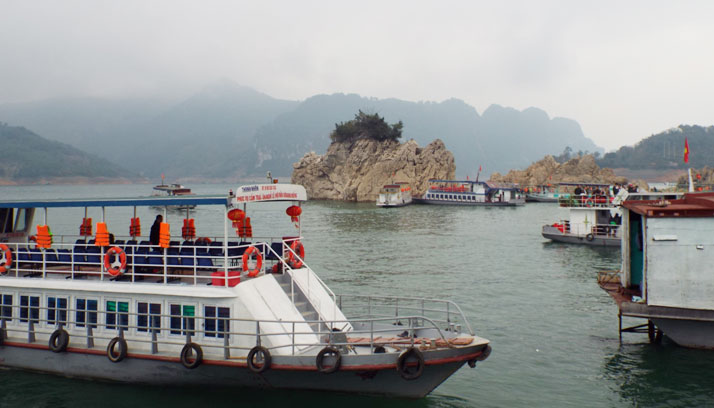
(HBO) - Hoa Binh Lake – an impossible-to-miss place, which is converging with natural beauty of water and clouds, charming scenery with many villages of bold cultural identity, friendly people, easy to close with many other tourist attractions. This place is hard to be ignored by visitors who want to enjoy, experience, especially in these summer days.

Hoa Binh Lake is a tourist attraction that
attracts visitors to come and experience.
Thung Nai is the ideal place for the tourists who
want to enjoy the wild beauty and fresh water scenery of Hoa Binh Lake, etc.
Thung Nai is located in the heart of the large Da River Lake, with rock islands
or bushy jungles. Thung Nai is beautiful to the heart, the surface of the lake
ripples early in the morning or the sunshine is covering the red water at the
sunset.
In Thung Nai, there is not only beautiful
landscapes but also many historical and cultural sites. You can go to Thac Bo
floating market on the weekend to feel the life of people living near the lake
area. Situated next to Thung Nai, the Temple of Thac Bo God - a spiritual
destination cannot be missed when visiting, sightseeing, and walking around Hoa
Binh Lake. Visiting Bo Temple - Thac Bo cave, visitors can learn about the
culture, living activities, production, life of local people, enjoying the
special taste of fish dishes of Da River, tasting the specialties of the
mountain forests, such as steamed chicken with lemon leaves, local pork grilled
with honey served on banana leaves, boiled bamboo shoots, steam rice, Tao Meo
wine, steamed forest vegetables with
fish sauce, etc. These bring unforgetable impression after the discovery of
Thac Bo Waterfall.
Another place is Dua Island, which is not far from
Bo Temple. This is one of the most beautiful islands in Hoa Binh area. Besides
Dua Island, tourists can choose the surrounding tourist destinations such as
Coi Xay Gio Island, Xanh Island, Ngoc Island, etc. to be able to experience
nature, culture, enjoying the food and specialities of the local host inviting,
such as smoked fish, wild vegetables with fish sauce, grilled pork, etc., which
are all clean and leave the unforgettable taste.
On the area of the lake, visitors can visit, stay
in the community tourism villages, which are still wild and preserved with
national identities such as Ngoi village, Ngoi Hoa commune; Ke village, Hien
Luong commune; Da Bia village, Tien Phong commune, etc.
Located just a 20-minute drive from Hoa Binh City, Ora Hill Farmstay & Glamping Hoa Binh is a captivating new destination nestled in Mo hamlet, Bình Thanh commune, Cao Phong district. Combining farming with leisure, this tranquil retreat is perfect for those seeking balance, joy, and an immersive experience in the expansive beauty of nature.
Muong Bi - Tan Lac is renowned as one of the four famous Muong regions in Hoa Binh province. Blessed by nature with a favourable climate and stunning landscapes, Tan Lac holds great advantages for tourism development. The local tourism industry has made remarkable strides in recent times thanks to the attention and support from the local authorities and sectors.
With its strategic location, well-developed transport network, and diverse soil and climatic conditions, Hoa Binh is emerging as a must-visit destination in Vietnam's northwestern tourism corridor. The province boasts numerous attractions, including the Kim Boi hot springs (Kim Boi district), the Dau Rong cave complex (Cao Phong), the Mai Chau valley (Mai Chau), and the iconic Hoa Binh hydropower plant.
The northern mountainous province of Hoa Binh has been listed among the 71 most beautiful places to visit worldwide by the prestigious US travel magazine Condé Nast Traveller.
Hoa Binh province’s rich natural and cultural resources position it as a prime location for developing community-based tourism (CBT). In recent years, support from central and provincial policies, as well as assistance from non-governmental organisations, have encouraged local ethnic minority and mountainous communities to actively engage in the sector.



